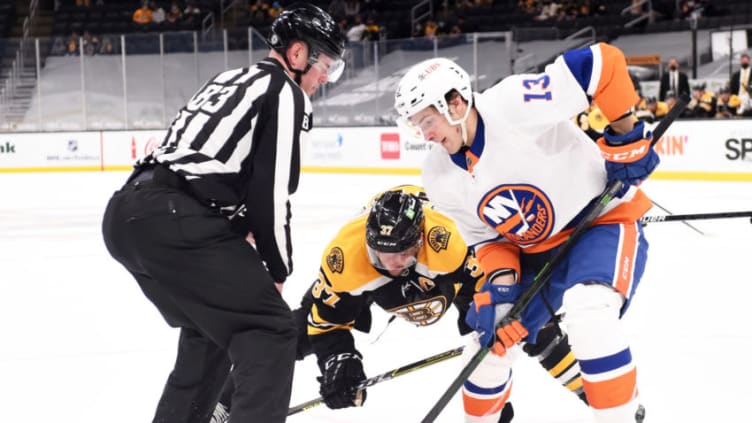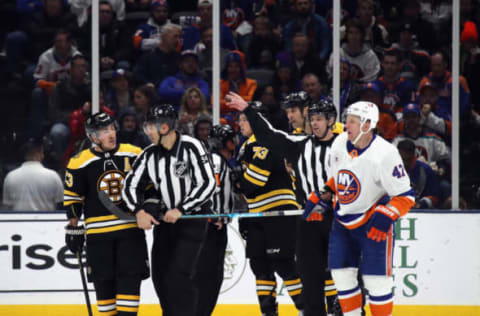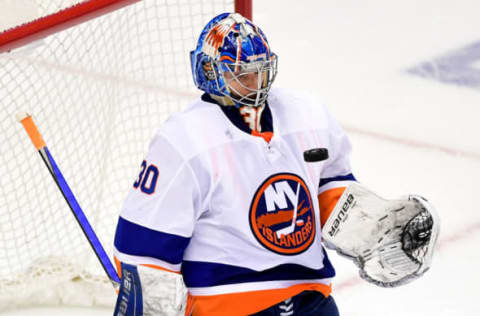Islanders: Three Takeaways from Game One Loss to Bruins


The New York Islanders were thoroughly outplayed in the opening game of their second-round series with the Boston Bruins, as they lost 5-2 at TD Garden.
The New York Islanders second-round matchup against the Boston Bruins began on Saturday night with a 5-2 loss. The Isles faced significant difficulty in holding on to the puck, and despite being opportunistic to keep the game tight through 40 minutes, could not hang with Boston in the third period after David Pastrnak’s hat-trick goal gave the Bruins the 3-2 lead.
Here are three takeaways from the 5-2 loss.
1. Islanders couldn’t get near the Boston slot
Despite being outshot and outplayed for most of the game, the Islanders kept game one tight on the scoreboard for the majority of play. That was in spite of the fact that they simply failed to ever meaningfully threaten Boston’s slot and net-front areas.
Sure, Anthony Beauvillier’s first-period tally to give New York the lead was redirected from the inner slot, but that was, unfortunately, the exception and not the norm in game one. By and large, New York failed to threaten from the dangerous areas, and it led to a lopsided game based on analytics.
The Islanders collected only 21.1% of expected goals (xG) in 52:38 of 5v5 play. That number is extremely low, obviously, and it comes from a mixture of the fact that New York was outpaced nearly two-to-one in unblocked shot attempts, but also because they couldn’t get shots from anywhere near the Boston slot at 5v5.
According to MoneyPuck’s interactive shots graphic, the Islanders tallied only six shot attempts from the inner slot all game. Three of those shots came in the first period, with one of those three being Beauvillier’s power-play goal.
New York’s inability to make Tuukka Rask’s job more difficult by slinging rubber from the dangerous areas was a major factor in their inability to win this game. It wasn’t that they weren’t opportunistic, but more so that they simply didn’t create quality scoring chances for themselves.
Natural Stat Trick recorded only two high-danger scoring chances for the Islanders all night. That is simply far too low a number, and New York will have to find ways to bring their performance in that metric up if they’re to compete in this series going forward.

2. The Barzal line’s performance
The Mathew Barzal line featuring Jordan Eberle and Leo Komarov played only 8:34 of 5v5 action on Saturday night, the lowest TOI of any Islanders forward line at 5v5. That line has not been great for New York recently, and as such, it isn’t difficult to see why they saw reduced ice time in game one.
That said, they did track as the team’s best forward line for the night in xGF%, according to Natural Stat Trick and MoneyPuck. They also played an integral part in creating the team’s only actual goal at 5v5 for the night.
However, that doesn’t take away from the fact that Barzal and his partners have been outplayed by opposing top lines in most games during the 2020-21 playoffs, and the contrast never seemed as stark as it did in Saturday’s game one.
The Bruins top forward group dubbed the perfection line, starred in Saturday’s contest. David Pastrnak, the pure sniper of that trio, had a hat-trick in game one, and his linemates Patrice Bergeron and Brad Marchand created a slew of dangerous plays for their teammates all night.
The Bruins controlled the puck in dominant fashion with their top line on the ice, winning the total 5v5 shot attempts battle in a 23-6 rout. With that group on the ice Boston also controlled 88.86% of xG, when adjusted for score and venue.
The takeaway here is simple, there is no Islanders line that needs to up its performance, and now, more than the Barzal group. They were decent on Saturday night, which easily passed them as the Islanders best forward trio in game one, but they need to be better than decent.
The Islanders need Barzal to be great. They need him to be Mathew Barzal. If they’re going to win game two and shift the balance of this series in their favor, they need Barzy to elevate those players around him and begin producing like the $7 million center they’ve entrusted him to be.

3. Ilya Sorokin’s Game One Performance
Without a strong performance in the net, the New York Islanders would’ve been blown away by a much more lopsided score in game one than we actually saw. Due to Ilya Sorokin’s strength in net, the team was able to keep things tight, and even stay in the game headed down the stretch in the third period.
Sorokin wasn’t phenomenal in net the way we saw him play in his 48-save game five performance during the Pittsburgh series. He wasn’t infallible, but he was the main contributor in keeping round two’s opening game as close as it was for as long as it was.
However, his rebound control was shaky at times in game one, and it led directly to Boston’s second goal when he kicked a puck straight to the stick of Pastrnak.
That said, it’s hard to ask more of Sorokin than he gave in game one. He was very good in net, despite his rebound control being an issue at times. He kept the game tight when the Islanders had no business being that close to stealing the contest.
New York has had to rely heavily upon him early in these playoffs. He’d won every contest he’d started up until Saturday night, and the Islanders will need him to continue bringing that same level of play to games on a consistent basis.
After game one it’s clear the Islanders are playing a better opponent with much better goaltending than they faced in round one against the Penguins.
Rask didn’t have to be outstanding to win game one, but his night was better than any that Tristan Jarry posted in the opening round. The Isles will have to find ways to get more bodies in front of Rask, and in the meantime, they’ll have to hope that Sorokin can continue standing tall in net for them.
He hasn’t given us a reason to believe he can’t do that in these playoffs. Only Monday’s game two will show us if that trend can continue.